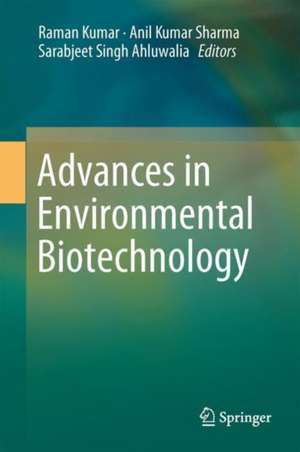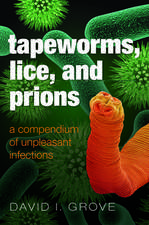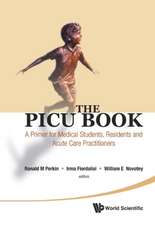Advances in Environmental Biotechnology
Editat de Raman Kumar, Anil Kumar Sharma, Sarabjeet Singh Ahluwaliaen Limba Engleză Hardback – 26 apr 2017
With advancements in the area of Environmental Biotechnology, researchers are looking for the new opportunities to improve quality standards and environment. Recent technologies have given impetus to the possibility of using renewable raw materials as a potential source of energy. Cost intensive and eco-friendly technology for producing high quality products and efficient ways to recycle waste to minimize environmental pollution is the need of hour. The use of bioremediation technologies through microbial communities is another viable option to remediate environmental pollutants, such as heavy metals, pesticides and dyes etc.
Since physico-chemical technologies employed in the past have many potential drawbacks including higher cost, and lower sustainability. So there is need of efficient biotechnological alternatives to overcome increasing environmental pollution. Hence, there is a need for environmental friendly technologies that can reduce the pollutants causing adverse hazards on humans and surrounding environment.
| Toate formatele și edițiile | Preț | Express |
|---|---|---|
| Paperback (1) | 526.19 lei 39-44 zile | |
| Springer Nature Singapore – 11 dec 2018 | 526.19 lei 39-44 zile | |
| Hardback (1) | 731.43 lei 39-44 zile | |
| Springer Nature Singapore – 26 apr 2017 | 731.43 lei 39-44 zile |
Preț: 731.43 lei
Preț vechi: 769.92 lei
-5% Nou
Puncte Express: 1097
Preț estimativ în valută:
139.98€ • 145.95$ • 116.33£
139.98€ • 145.95$ • 116.33£
Carte tipărită la comandă
Livrare economică 17-22 martie
Preluare comenzi: 021 569.72.76
Specificații
ISBN-13: 9789811040405
ISBN-10: 9811040400
Pagini: 315
Ilustrații: X, 288 p. 33 illus., 18 illus. in color.
Dimensiuni: 155 x 235 x 22 mm
Greutate: 0.7 kg
Ediția:1st ed. 2017
Editura: Springer Nature Singapore
Colecția Springer
Locul publicării:Singapore, Singapore
ISBN-10: 9811040400
Pagini: 315
Ilustrații: X, 288 p. 33 illus., 18 illus. in color.
Dimensiuni: 155 x 235 x 22 mm
Greutate: 0.7 kg
Ediția:1st ed. 2017
Editura: Springer Nature Singapore
Colecția Springer
Locul publicării:Singapore, Singapore
Cuprins
Chapter 1. Introduction to Environmental Biotechnology.- Chapter 2. Measurement of Environmental Pollution: Types and Techniques.- Chapter 3. Need For the Advanced Technologies for Wastewater Treatment.- Chapter 4. Perspectives of Bioreactors in Wastewater Treatment.- Chapter 5. Bioremediation Technologies for the Removal of Pollutants.- Chapter 6. Bioremediation Technologies for Decolorization of Effluent.- Chapter 7. Bioremediation of Tannery Wastewater.- Chapter 8. Sustainable Environmental Biotechnology.- Chapter 9. Application of Nanotechnology in the Environment Biotechnology.- Chapter 10. Biofertlizers and Biopesticides: Eco-friendly Biological Agents.- Chapter 11. Approaches to Agro Industrial Solid Waste Disposal and Bioenergy Generation.- Chapter 12. Role of Genetically Modified Microorganisms in Heavy Metal Bioremediation.- Chapter 13. Agriculture Biotechnology.- Chapter 14. Recent Advances in Phytoremediation Technology.- Chapter 15. Microbial Flora and Biodegradation of Pesticides: Trends, scope and Relevance.- Chapter16. Biosensors: A Tool for Environmental Monitoring and Analysis.
Notă biografică
Dr. Raman Kumar is working as Associate Professor in Department of Biotechnology, Maharishi Markendeshwar University, Mullana (Ambala), Haryana, India Since 2011. He has also worked as Senior Research Fellow, Division of Soil and Crop Management, Central Soil Salinity Research Institute, Karnal, India from 2007 to 2010. He has experience of about 10 years in the field of Teaching and Research in the area of Microbial and Environmental Biotechnology. He has published more than 30 publications in Various National and International Peer Reviewed Journals. He developed many bacterial and fungal strains for removal of heavy metals from wastewater. His current research areas are Bioremediation and Biodegradation of toxic pollutants, Pesticides and azo dyes using microbial consortium from the industrial Effluents, Mechanism involved in the heavy metal bioremediation.
Dr. Anil K. Sharma is a full Professor and Head of the Department of Biotechnology with about 15 years of Teaching and Research experience after PhD. He did his doctorate from PGIMER Chandigarh (Year 2000) in the field of Medical Biotechnology. He worked as a Senior Research Scientist and a Post Doctoral Research Fellow (Molecular biology) in the Microbiology and Immunology Department at UIC College of Medicine Chicago, IL,USA for about 7.5 years. He has more than 80 publications in peer-reviewed journals of national and international repute with a cumulative impact factor of his publications around 115. He has won many prestigious awards and accolades in his career. In 2000, He was felicitated with a MGIMS Young Scientist Award from Association of Clinical Biochemists of India (ACBI) while in 2013 he won the Bharat Excellence Award from FFI, New Delhi, India for his research accomplishments in basic sciences. His research interests are diverse ranging from understanding the metal regulation in prokaryotes and eukaryotes, drug resistance, cancer biology, nanomedicines to thedevelopment of microbial strains for remediation of heavy metals and pesticides.
Dr. Sarabjeet Singh Ahluwalia is presently working as an Assistant Professor at Department of Biotechnology, at General Shivdev Singh Dewan Gurbachan Singh Khalsa College, Patiala, Punjab (India). He did his M.Sc. in Biotechnology from Punjabi University Patiala, Punjab (India) and Ph.D. from Thapar Institute of Engineering & Technology Patiala, Punjab (India). He has 22 years of research experience including ten years of teaching microbiology, environmental Biotechnology, Microbial Technology for graduate students. Dr. Ahluwalia has published 25 research papers in peer reviewed international and national journals in addition, he has presented 33 research papers in conferences and symposia along with three patent in his credit. Dr. Ahluwalia has reviewed a number of research papers/manuscripts. Dr. Ahluwalia has received the Grants from UGC, Govt. Of India, New Delhi and CSIR, NewDelhi for research projects.
Further, he has developed the technology for the removal of Cr (VI) from chrome effluent. Besides that, he is a fellow Member of Research Journal of Chemistry & Environment as well as a life member of Biotechnology Research Society of India, Association of Microbiologist of India, and Punjabi Academy of Sciences. His research intrests are in the field of Environmental Biotechnology, Bioremediation, and Environmental monitoring.
Dr. Anil K. Sharma is a full Professor and Head of the Department of Biotechnology with about 15 years of Teaching and Research experience after PhD. He did his doctorate from PGIMER Chandigarh (Year 2000) in the field of Medical Biotechnology. He worked as a Senior Research Scientist and a Post Doctoral Research Fellow (Molecular biology) in the Microbiology and Immunology Department at UIC College of Medicine Chicago, IL,USA for about 7.5 years. He has more than 80 publications in peer-reviewed journals of national and international repute with a cumulative impact factor of his publications around 115. He has won many prestigious awards and accolades in his career. In 2000, He was felicitated with a MGIMS Young Scientist Award from Association of Clinical Biochemists of India (ACBI) while in 2013 he won the Bharat Excellence Award from FFI, New Delhi, India for his research accomplishments in basic sciences. His research interests are diverse ranging from understanding the metal regulation in prokaryotes and eukaryotes, drug resistance, cancer biology, nanomedicines to thedevelopment of microbial strains for remediation of heavy metals and pesticides.
Dr. Sarabjeet Singh Ahluwalia is presently working as an Assistant Professor at Department of Biotechnology, at General Shivdev Singh Dewan Gurbachan Singh Khalsa College, Patiala, Punjab (India). He did his M.Sc. in Biotechnology from Punjabi University Patiala, Punjab (India) and Ph.D. from Thapar Institute of Engineering & Technology Patiala, Punjab (India). He has 22 years of research experience including ten years of teaching microbiology, environmental Biotechnology, Microbial Technology for graduate students. Dr. Ahluwalia has published 25 research papers in peer reviewed international and national journals in addition, he has presented 33 research papers in conferences and symposia along with three patent in his credit. Dr. Ahluwalia has reviewed a number of research papers/manuscripts. Dr. Ahluwalia has received the Grants from UGC, Govt. Of India, New Delhi and CSIR, NewDelhi for research projects.
Further, he has developed the technology for the removal of Cr (VI) from chrome effluent. Besides that, he is a fellow Member of Research Journal of Chemistry & Environment as well as a life member of Biotechnology Research Society of India, Association of Microbiologist of India, and Punjabi Academy of Sciences. His research intrests are in the field of Environmental Biotechnology, Bioremediation, and Environmental monitoring.
Textul de pe ultima copertă
The book aims to provide a comprehensive view of advanced environmental approaches for wastewater treatment, heavy metal removal, pesticide degradation, dye removal, waste management, microbial transformation of environmental contaminants etc.
With advancements in the area of Environmental Biotechnology, researchers are looking for the new opportunities to improve quality standards and environment. Recent technologies have given impetus to the possibility of using renewable raw materials as a potential source of energy. Cost intensive and eco-friendly technology for producing high quality products and efficient ways to recycle waste to minimize environmental pollution is the need of hour. The use of bioremediation technologies through microbial communities is another viable option to remediate environmental pollutants, such as heavy metals, pesticides and dyes etc.
Since physico-chemical technologies employed in the past have many potential drawbacks including higher cost, and lower sustainability. So there is need of efficient biotechnological alternatives to overcome increasing environmental pollution. Hence, there is a need for environmental friendly technologies that can reduce the pollutants causing adverse hazards on humans and surrounding environment.
With advancements in the area of Environmental Biotechnology, researchers are looking for the new opportunities to improve quality standards and environment. Recent technologies have given impetus to the possibility of using renewable raw materials as a potential source of energy. Cost intensive and eco-friendly technology for producing high quality products and efficient ways to recycle waste to minimize environmental pollution is the need of hour. The use of bioremediation technologies through microbial communities is another viable option to remediate environmental pollutants, such as heavy metals, pesticides and dyes etc.
Since physico-chemical technologies employed in the past have many potential drawbacks including higher cost, and lower sustainability. So there is need of efficient biotechnological alternatives to overcome increasing environmental pollution. Hence, there is a need for environmental friendly technologies that can reduce the pollutants causing adverse hazards on humans and surrounding environment.
Caracteristici
Provides a comprehensive, accessible, up-to-date information about environmental aspects. Modern tools and next generation techniques employed in environmental engineering. Offers an instant access to a wealth of key environmental techniques/issues which is immensely useful not only to environmental scientists but also to the students from diverse streams of biotechnology and environmental engineering. Sustainable solutions to the global climate changes and other environmental hazards addressed.





